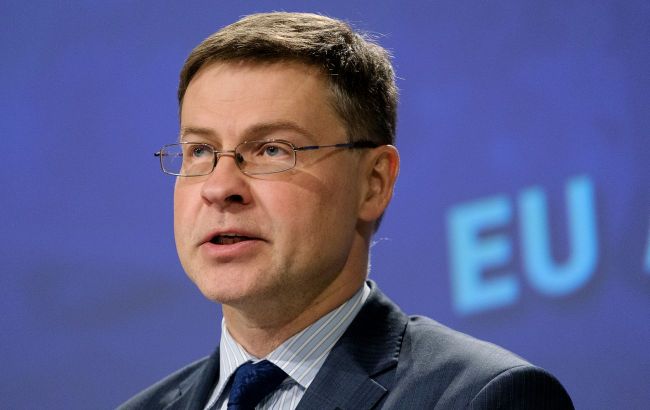EU commissioner urges G7 to speed up $50 billion loan to Ukraine
 Photo: European Commissioner for Economic Affairs Valdis Dombrovskis (Getty Images)
Photo: European Commissioner for Economic Affairs Valdis Dombrovskis (Getty Images)
EU Commissioner for Economy Valdis Dombrovskis has urged the G7 to accelerate payments on the $50 billion loan to Ukraine, amid Belgium's continued blocking of the funding scheme using frozen Russian assets, according to Euractiv.
Dombrovskis noted that countries should accelerate payments to Ukraine under the G7 loan agreed in June last year, in order to close the financial gap at the beginning of next year.
"We are in discussions with other international donors, seeing whether their support can be frontloaded to the beginning of the year," the EU commissioner said.
He noted that the donors include the United Kingdom, Canada, Japan, and the United States.
Dombrovskis added that this support could be enough to cover Ukraine's financial needs in the first quarter of next year, although this still "remains to be seen."
The EU has already paid its portion of the G7 loan, amounting to €18.1 billion. However, roughly €14 billion from the package remains unpaid by other countries, namely the US, Canada, Japan, and the UK.
Estimates suggest Ukraine will face a $12 billion budget shortfall in the first quarter of next year.
Dombrovskis' statement comes as the EU tries to negotiate a separate "reparations loan" for Ukraine using frozen Russian assets. The European Commission hopes to convince Belgium to support the scheme before the leaders' summit in December. These efforts faced a setback on Thursday, when Prime Minister Bart De Wever sharply criticized the plan in a letter to European Commission President Ursula von der Leyen.
G7 loan to Ukraine
In June last year, G7 leaders agreed to provide Kyiv with a $50 billion loan, partially funded by interest earned on Russian assets frozen after Russia's full-scale invasion of Ukraine in February 2022.
European Council President António Costa said in December that starting January, Ukraine would receive €1.5 billion per month from the EU. These funds come from the use of frozen Russian assets and "can also be used for military purposes."
The European Commission also proposed a €140 billion "reparations loan" for Ukraine, intended to be secured by frozen Russian assets held by the EU since the start of the war.
For Ukraine to receive this "reparations loan," all EU member states must agree. However, Belgium, which holds the largest share of frozen Russian assets, has blocked the initiative.
European Commission President Ursula von der Leyen said the EU will soon present a legislative proposal allowing frozen Russian assets to be used to provide Ukraine with the €140 billion "reparations loan."

